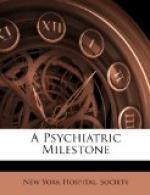But however absurd her statement regarding her being touched by a “blackbird” and all her vitality removed might appear to superficial observation, it must be admitted that when we know the mental content of that patient, we cannot but see that at any rate it was not so irrational. And not only was this recognized by the doctor, but, and this is much more important, by the patient herself.
It is, therefore, the mental content which must be discovered before doctor or patient can understand the disability and before any common ground between the two can be found. And when the mental content is known it will be easy to recognize the affective condition of the patient to be a normal response. It will also be specific and if intense will dominate the patient. “Why is it I can never feel joy as I used to do?” was the pathetic inquiry of the patient dominated by a feeling of misery and fear. Was it not for the reason that being dominated by misery and fear, joy could find no place? The emotion of misery because of its intensity could more or less inhibit the feeling of joy, but joy could not inhibit the misery.
No repetition of the memory of the unpleasant experiences with their associated emotion of misery and fear led to the formation of a habit of mind and feeling. And when once such a habit of mind is established it is remarkable by what a host of stimuli received in ordinary daily life the cause of the disturbance can be recalled.




